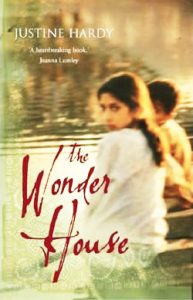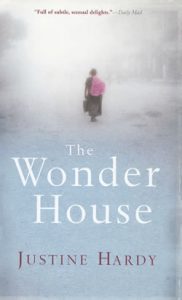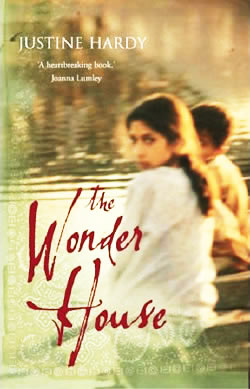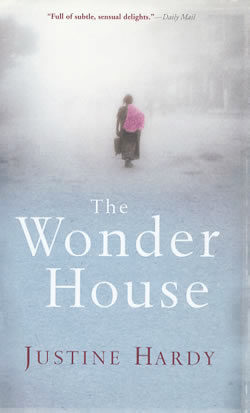The Wonder House
Read an extract…
Read a review…
Read an interview…


Extract – Part 1
Prologue
Before the insurgency – Kashmir, North India, September 1975.
It broke down into a series of single images, postcards to keep, like the ones lined up at the stalls along the boulevard by the lake: single focus, captured and stored. There were his upper fingers where his hand pressed into the bark beside her head, a hand she had seen all her life without noticing the length of its joints from knuckle to nail. His face blocked out the light, dark in front of the sun. She could feel his breath but she could not separate out his features on their unlit plain. There was movement all around them: the slow irritation of his mule’s tail, the way her harness shifted as she did, layers of leaves above them, trapping and releasing the light that his face had blocked out, the way the earth breathed in the heat, and how it shifted as she tried to be still.
Everything peripheral withdrew as his face moved to rest against the side of hers. He settled against the length of her body, the buttress of his hip tucking into the space below her ribcage.
The hands that she had seen scooping and wrapping the food that she had cooked, fingers she had watched flicking star anise out of her pilau as the grains stuck to his skin, moved across her. Her back slid down the tree, bark rucking up her thin cotton tunic until she was crouched at its trunk. She tasted the sweat at the sides of his mouth as his head blocked the light again.
She did not close her eyes.
The mule watched, turned towards them, part of their intersection. She threw up her head as the girl shouted out.
This pain was the only thing she had to give him and it snapped through both of them. They lay in silence under the great cedar tree, clinging in the subsidence.
The tree had been marked for timber. The boy had brought her to see it before it was felled. That was his job.
Extract – Part 2
Prologue Continued…
After the Kargil War, October 1999.
The Wonder House sits low in the water on the edge of Nagin Lake in Srinagar, the summer capital of Kashmir. One corner is made from seasoned Kashmiri cedar that is a little older than the wood of the rest of the boat. It panels the lakeside edge of the sitting room. At about the time when girls from Eve’s Garden School paddle home across the lake in their lotus leaf-green uniforms, afternoon light crosses the room and rests in the corner, saturating the wood. After the girls have gone, the outlines of the furniture in the sitting room begin to fade and disintegrate into the sliding light. It crosses the room in a retreating diagonal until only a small table in the corner made of older wood remains suspended in the last of the day, just where particles of dust circle in the retreating bands of light.
The merchant who sold the cedar to the builder of the Wonder House had waited a long time to be rid of those timbers. He had begun to think he was stuck with them, that they were his punishment for trying to make money from a marked tree.
When insurgents in Kashmir are shot, or when
they kill soldiers, and when ordinary people are murdered in the crossfire under the thick cedars of the forests, the trees are singled out with a red cross on their bark. The foresters believe that wood is porous to emotion, to human pain and joy, and that to frame and clad a house, or to build a boat of timber from trees rooted under death is to curse the family who will live with those vibrations of violence held in the grain, the whorls and knots, like human scars.
Reviews
‘The Wonder House remains a novel that is always poised, often engrossing, and sometimes perceptive and moving. I, for one, will await her next novel with some eagerness.’
The Guardian
‘Hardy’s evident intimacy with and affection for the troubled landscape and people of her novel lend The Wonder House an air of distinction that sets it a little apart from the ordinary run of summer romances.’
The Times
‘Hardy, in the careful, objective style of documentary journalism, allows us to experience a society where ordinary lives come under persistent attack from those who would dictate to others how they might or might not live out their days.’
The Hudson Review
‘Hardy brings no baggage to the telling of the story; there is no question of taking sides or delivering covert sermons. This is basically a well-defined story with well-defined characters; it just so happens that the tale unfolds in Kashmir, imparting and infusing it with touches of beauty and pain.‘
The Hindu
Interviews
When the journalist Justine Hardy was sent to Kashmir in the early 1990s, she didn’t imagine that some 15 years later the conflict would be rumbling on and that she would even set her first novel there.
Justine joins Martha to talk about making a home with a Muslim family in a place that is considered a crucible of Islamic extremism and how the experience inspired her romantic book The Wonder House. Listen to the interview…
BBC Radio 4 Woman’s Hour interview with Justine on The Wonder House
(Please note you will need RealPlayer to listen to this item)
Journalist, documentary filmmaker on her debut novel, The Wonder House, set in troubled Kashmir
Born in England, trained as a journalist in Australia, a globe-trotting travel writer, why set your novel in Kashmir?
I lived in India as a child and have been here for 15 years now. As a journalist covering Kashmir, there were so many stories I wasn’t allowed to tell. I thought of putting them into a novel. Read Full Interview..
Outlook India




